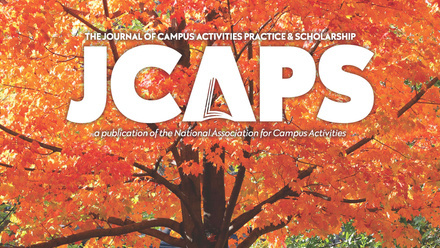Committing to intentional practice: Using the practitioner scholarship of Adam Peck to demonstrate an innovative path for campus - JCAPS Vol. 5 Issue 1
On the morning of September 30th, 2022, Dr. Adam Peck died from injuries sustained in a pedestrian accident. He was 49 years old. His name may not be well recognized in higher education, but he was not one for fanfare or the spotlight. Yet, he did his best to help students succeed. As we expound upon below, to those who knew Dr. Peck, we understood him as a storyteller. He told and enacted stories of caring, curiosity, compassion, scholar- ship, and intellectualism - a life lived well. This article is his story as well as the story of how the campus activities profession must continue his work.
The Advisory Board of the Journal of Campus Activities Practice and Scholarship sought to honor Adam’s legacy by using his published works as data that amplify his essential perspectives for the campus activities profession, student affairs, and higher education. Who was Adam Peck, and why should campus activities professionals pay attention to his scholarship? At the time of his death, Dr. Peck served as Assistant Vice President for Student Affairs at Illinois State University. During his 25 years in student affairs, he served in a variety of other roles, including assistant vice president and dean of students at Stephen F. Austin State University and director of student life at Saint Louis University. Adam was unique in that he was a student affairs professional who met the criteria of being a practitioner-scholar, an administrator in which research, contributing to it and consuming it, plays a significant role (Jablonski et al., 2006; Sriram & Oster, 2012). Dr. Peck not only wanted to engage in scholarly pursuits, he needed to because he believed writing clarified his thinking about complex issues and guided his practice. The act of writing advanced his professional practice in that what he wrote set a trail, so he would not get lost and forced to double back on his efforts. He refused to work for a president who did not support his scholarly pursuits, and he worked tirelessly to prompt other campus activities professionals to see the benefit of scholarship to innovative practice. A co-author wrote,
He was a visionary who knew how to make the vision come to fruition... Working with Adam taught me the importance of utilizing writing as a technique for building enthusiasm for an idea or product. He had a way of articulating concepts that showed people the value of his ideas and, more importantly, how they could benefit from them... I could feel Adam’s enthusiasm for the topic when writing with him. He wasn’t just writing the article as a way to add to his resume; he was passionate about the topic. That passion came through in every conversation we had about the article and in every word he wrote. I felt as if writing this article made me a part of a grand movement that he was championing and made me feel honored that he wanted to write with me. (T. Davis, personal communication, December 29, 2022)
Because Dr. Peck sought to move the field forward in innovative and purposeful ways, paying attention to his scholarship demonstrates a path forward in increasing the professionalization of campus activities.
We used Dr. Peck’s scholarship as data that reveal the themes of a professional life dedicated to practitioner scholarship. We integrated these themes with the experiences of some of Dr. Peck’s co-authors. More specifically, we conducted a phenomenological content analysis of Dr. Peck’s scholarship and the experiences of those who wrote with him.






